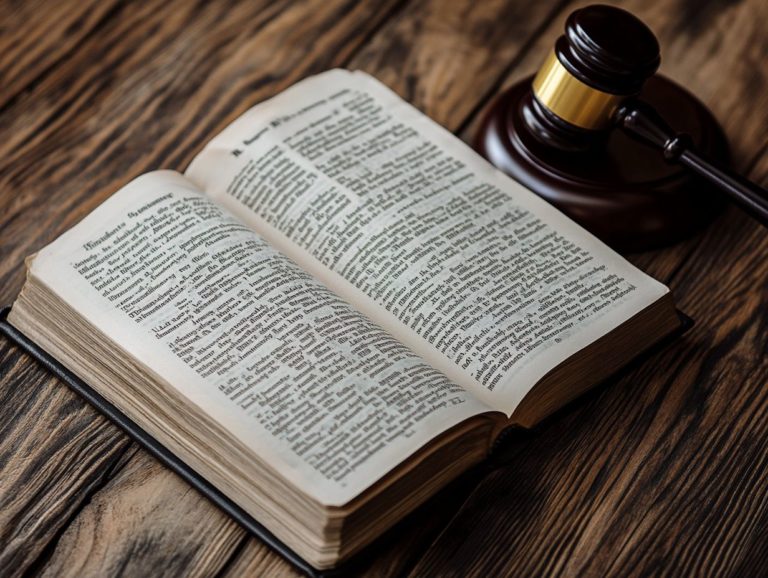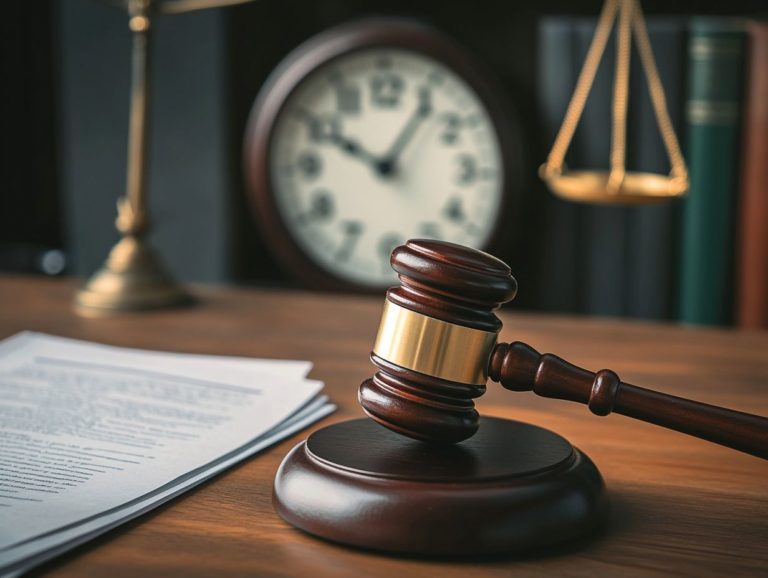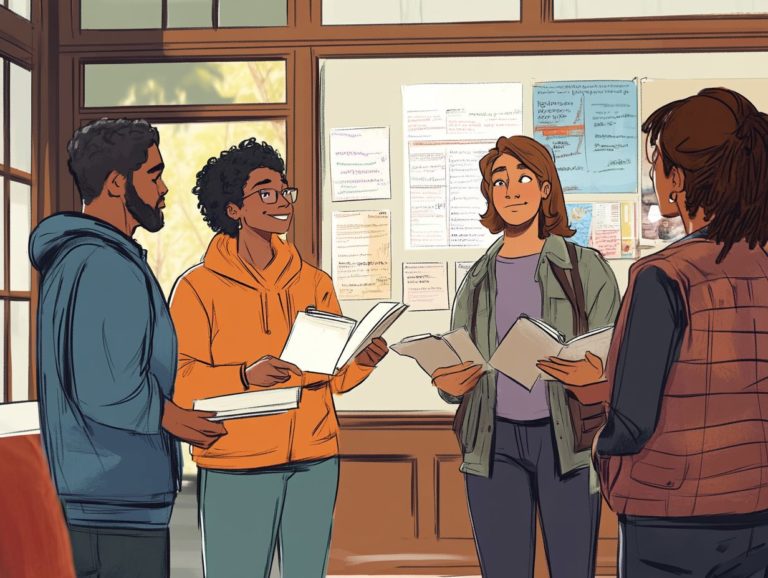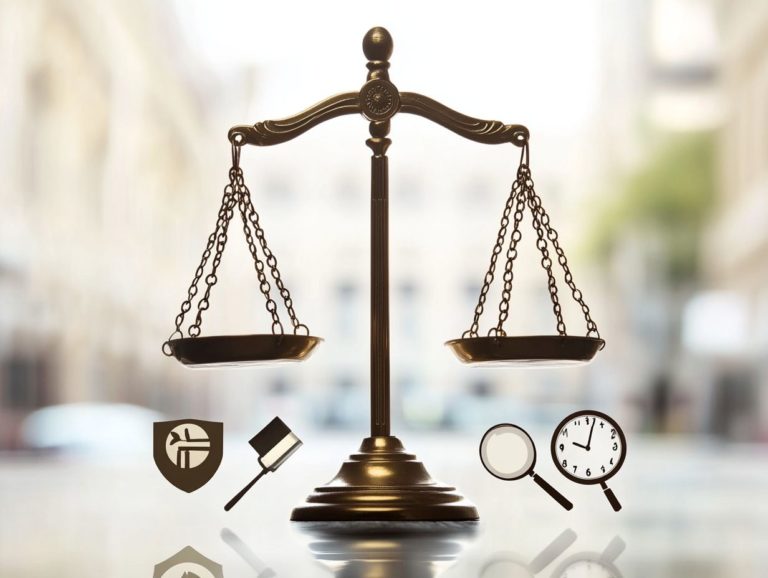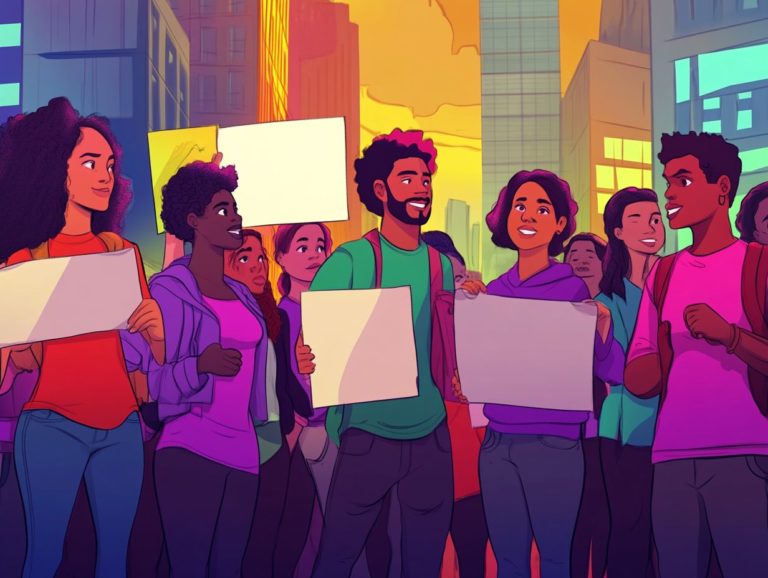5 Myths About the Rights of the Accused
In the realm of criminal justice, misconceptions about the rights of the accused can have serious repercussions. Many believe that those accused are automatically guilty or that they lack fundamental protections.
This article debunks five prevalent myths, illuminating the essential rights that safeguard individuals during legal proceedings.
You ll explore the presumption of innocence, the significance of fair trials, and the crucial role that legal representation plays in this process. It’s crucial to grasp these rights to protect yourself!
Contents
- Key Takeaways:
- 1. The Accused Is Automatically Considered Guilty
- 2. The Accused Has No Rights
- 3. The Accused Can Be Denied a Fair Trial
- 4. The Accused Can Be Held Indefinitely Without a Trial
- 5. The Accused Does Not Need a Lawyer
- What Are the Rights of the Accused in the Legal System?
- Frequently Asked Questions
- What are the top 5 myths about the rights of the accused?
- Is it true that the accused always gets a fair trial?
- Do the accused have the right to remain silent?
- What does it mean to have the right to a speedy trial?
- Are the accused always guilty?
- Do the accused have the right to a court-appointed attorney?
Key Takeaways:
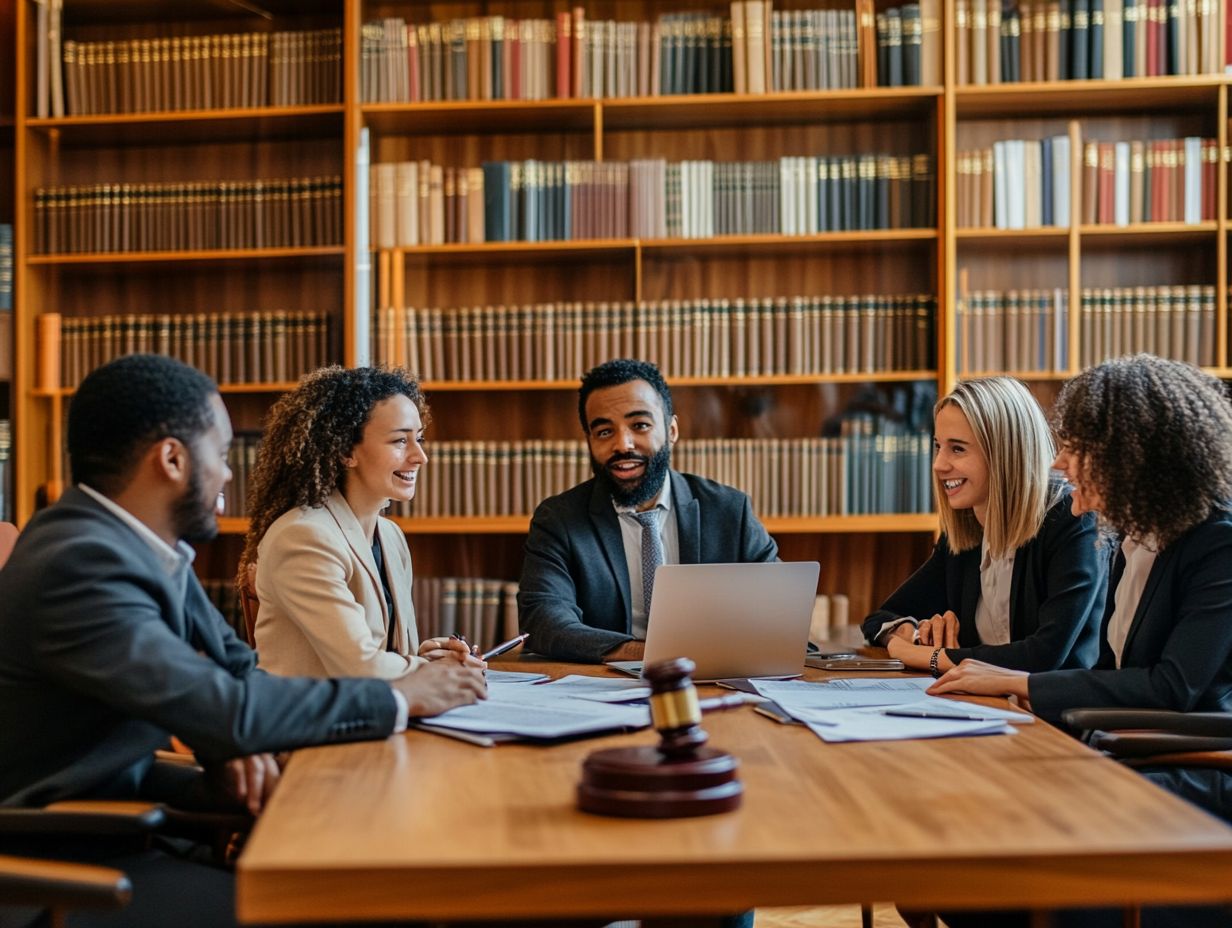
The presumption of innocence is a crucial right for the accused, and they should not be considered guilty without evidence. The accused has rights, including the right to a fair trial and the right to a lawyer. Denying these rights can lead to wrongful convictions and a violation of human rights.
1. The Accused Is Automatically Considered Guilty
In a functioning criminal justice system, the principle of “innocent until proven guilty” ensures that you, as an accused individual, receive fair legal representation. No one should be labeled guilty without sufficient evidence and due process.
This vital legal protection safeguards your rights in the courtroom, countering misconceptions that distort public perception of criminal cases. It creates a necessary balance of power between the prosecution and defense, placing the burden of proof on the state.
Consider high-profile trials where jurors face intense media scrutiny and public opinion that can cloud their judgment. Ignoring this principle leads to a rush to judgment, compromising the integrity of the judicial process and undermining public trust in legal institutions.
Criminal defense attorneys play an essential role in challenging evidence and advocating for your rights, ensuring that the courtroom remains impartial. When the presumption of innocence is overshadowed, defense attorneys not only defend you but also protect the foundation of justice.
2. The Accused Has No Rights
Contrary to popular belief, you have many rights established by the U.S. Constitution. These rights protect you during the challenges of the legal process.
These protections are vital for ensuring you receive a fair trial, a cornerstone of true justice. Your right to legal representation means you can have an experienced attorney advocating for you, navigating the intricacies of the law and ensuring your voice is heard.
The right to remain silent is another crucial safeguard which means you don t have to say anything that could make you look guilty, giving you space to weigh your options without pressure.
Such rights are essential in preventing wrongful convictions and maintaining the integrity of the legal process. Defense lawyers work diligently to uncover any violations and ensure that justice is served on your behalf.
3. The Accused Can Be Denied a Fair Trial
The idea that an accused person could be denied a fair trial undermines the principles of justice upheld by the legal process. This highlights the importance of competent legal representation.
A fair trial isn t just crucial for the accused; it s essential for maintaining public trust in the legal system. When bias, whether from media sensationalism or personal prejudices, seeps into proceedings, outcomes can be tragically distorted.
Often, defense lawyers struggle for resources, leaving them ill-equipped to mount a robust challenge, compromising the accused’s pursuit of justice.
Mishandling evidence can jeopardize the trial s validity, threatening the foundation of truth. These issues converge to create an environment where justice is obscured, affecting individual cases and the system as a whole, leading to societal inequalities and eroding faith in judicial processes.
4. The Accused Can Be Held Indefinitely Without a Trial

The notion that the accused can be held indefinitely without a trial raises significant concerns about the protections afforded to individuals by the legal system. It underscores the critical need for timely consultation with an attorney and the swift resolution of criminal charges.
Prolonged pretrial detention can have a profound effect, impacting not only the mental and emotional well-being of defendants but also their ability to effectively prepare a defense. Under the Sixth Amendment, you have the right to a speedy trial. However, case law, such as Barker v. Wingo, illustrates how delays can result in unjust outcomes.
These delays can obstruct access to vital evidence, limit the availability of witnesses, and intensify the financial burdens on defendants, who often find themselves incarcerated. This jeopardizes fundamental rights. It undermines the integrity of the entire judicial process.
5. The Accused Does Not Need a Lawyer
The misconception that you don t need a lawyer is a perilous one. You must have skilled legal help to navigate the courtroom. Effective legal assistance from skilled criminal defense attorneys is essential for understanding the legal system.
A defense lawyer is crucial in ensuring you fully grasp your rights and the legal process at hand. Without their professional guidance, you risk jeopardizing your case or overlooking vital evidence that could work in your favor.
Statistics reveal that defendants who choose to represent themselves are far less likely to achieve favorable outcomes. In fact, studies consistently show that those with legal counsel enjoy a significantly higher success rate in courts.
Case studies show that lacking a skilled defense can lead to harsh penalties, reinforcing the necessity of having an experienced attorney by your side.
What Are the Rights of the Accused in the Legal System?
The rights of the accused within the legal system encompass a robust array of protections crafted to uphold justice. These rights are crucial for ensuring you get a fair trial, allowing you to assert your legal rights and receive fair representation throughout the legal process.
These rights embody principles such as the presumption of innocence, the right to remain silent, and the right to counsel, as articulated in pivotal laws like the Sixth Amendment of the United States Constitution.
Legal representatives are ethically obligated to advocate passionately on your behalf. By safeguarding these rights, the legal framework not only fosters transparency and accountability but also balances the power dynamics intrinsic to the justice system.
Ultimately, these protections enhance public confidence in legal processes and uphold the integrity of the judicial system, making them essential for societies committed to fairness.
What Is the Presumption of Innocence?
The presumption of innocence is a cornerstone of legal practice that asserts you are considered innocent until proven guilty. This principle is key for how defense attorneys represent their clients.
Rooted in ancient Roman law and now a fixture in modern legal systems, this concept underscores the importance of protecting individual rights and ensuring fair trials. By placing the burden of proof squarely on the prosecution, it creates an environment in which jurors are encouraged to deliberate impartially, concentrating on the evidence rather than any preconceived notions about you.
This principle not only shapes the dynamics of the courtroom but also influences how witnesses approach their testimonies. It instills a greater sense of accountability and fairness in their statements.
Ultimately, the presumption of innocence is vital for maintaining public confidence in the justice system.
How Does the Right to a Fair Trial Protect the Accused?

The right to a fair trial is a critical pillar of the legal system. It ensures that you, the accused, can trust that your case will be heard impartially. This principle safeguards your interests through competent legal representation and strong defense strategies.
At its core, this principle comprises several vital components that work together to ensure fairness. Impartial jurors are essential. They bring neutrality to the deliberation process, preventing personal biases from clouding the verdict.
Access to evidence gives you the power to challenge the prosecution’s claims effectively. It provides you with the tools to present your case with conviction. Equally important is your right to question witnesses. This allows you to scrutinize testimonies and uncover inconsistencies that could strengthen your defense.
Together, these elements create a balanced framework that protects your rights as you navigate legal challenges. Ultimately, this reinforces the integrity of the judicial system.
What Is the Role of a Lawyer in Defending the Accused?
The role of a lawyer in defending the accused is a complex job. It encompasses legal representation, defense advocacy, and ensuring that the rights of the accused are upheld throughout the criminal proceedings.
This responsibility includes creating strong defense strategies tailored to each case. Lawyers must also maintain open lines of communication with clients to keep them informed and engaged.
Navigating the complexities of the courtroom is crucial. Lawyers must be adept at interpreting legal nuances and responding swiftly to the prosecution’s arguments.
Your expertise aids in presenting compelling defenses and negotiating agreements that can reduce charges. It also plays a vital role in critically evaluating evidence.
Ultimately, your effectiveness as a defense attorney significantly impacts the likelihood of favorable outcomes for those you represent.
What Are the Consequences of Denying the Rights of the Accused?
Denying the rights of the accused can have severe consequences. It undermines the legal process and can lead to wrongful convictions and miscarriages of justice.
This situation can shatter public trust in the integrity of legal institutions. It makes people question the fairness of trials happening around them.
For instance, a study by the Innocence Project reveals that 75% of wrongful convictions stem from a failure to protect these fundamental rights.
Every case where rights are violated serves as a stark reminder of the high stakes involved. These situations often result in devastating repercussions not just for the affected individuals, but for society as a whole.
Over time, this erosion of trust can ignite civic unrest. Communities may unite against perceived injustices, demanding reform and accountability from their legal systems.
How Can the Rights of the Accused Be Protected and Upheld?
Protecting and upholding the rights of the accused is vital for maintaining the integrity of the legal system. It requires a concerted effort from legal representatives, the courts, and advocacy groups committed to ethical duties.
To ensure that individuals facing charges are treated fairly, you need more than just a solid legal education. Informed and proactive defense strategies are essential. Public defenders often stand as the first line of defense against potential injustices.
Community awareness and advocacy are crucial in the pursuit of justice. They give you the power to understand your rights and support reforms that strengthen legal protections.
By fostering open dialogues and holding institutions accountable, you can contribute to a more equitable justice system that honors the fundamental rights of every individual, regardless of their circumstances.
Frequently Asked Questions
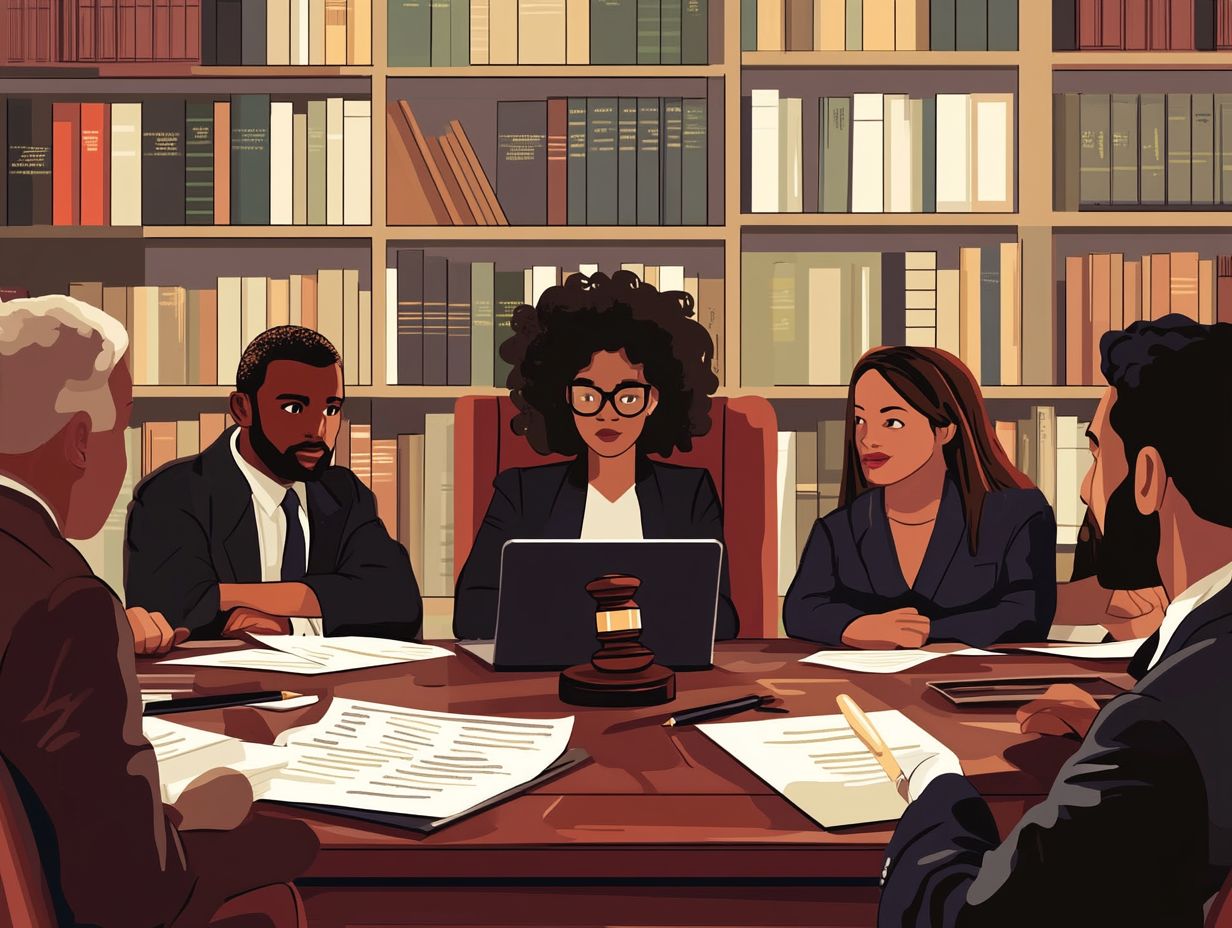
What are the top 5 myths about the rights of the accused?
The top 5 myths about the rights of the accused are: 1) The accused always gets a fair trial. 2) The accused have the right to remain silent. 3) The accused have the right to a speedy trial. 4) The accused are always guilty. 5) The accused are entitled to a court-appointed attorney.
Is it true that the accused always gets a fair trial?
The accused do not always get a fair trial. Biased jurors, poor legal representation, and media influence can affect fairness.
Do the accused have the right to remain silent?
The accused have the right to remain silent, known as the Miranda warning. This protects them from self-incrimination, but staying silent can sometimes work against them in court.
What does it mean to have the right to a speedy trial?
The right to a speedy trial means the accused should be tried within a reasonable time. However, “speedy” varies and is determined by the court.
Are the accused always guilty?
The accused are not always guilty. The principle of “innocent until proven guilty” underpins our justice system, placing the burden of proof on the prosecution.
Do the accused have the right to a court-appointed attorney?
The accused have the right to a court-appointed attorney if they cannot afford one. This ensures access to legal representation, although the quality may vary compared to private attorneys.

